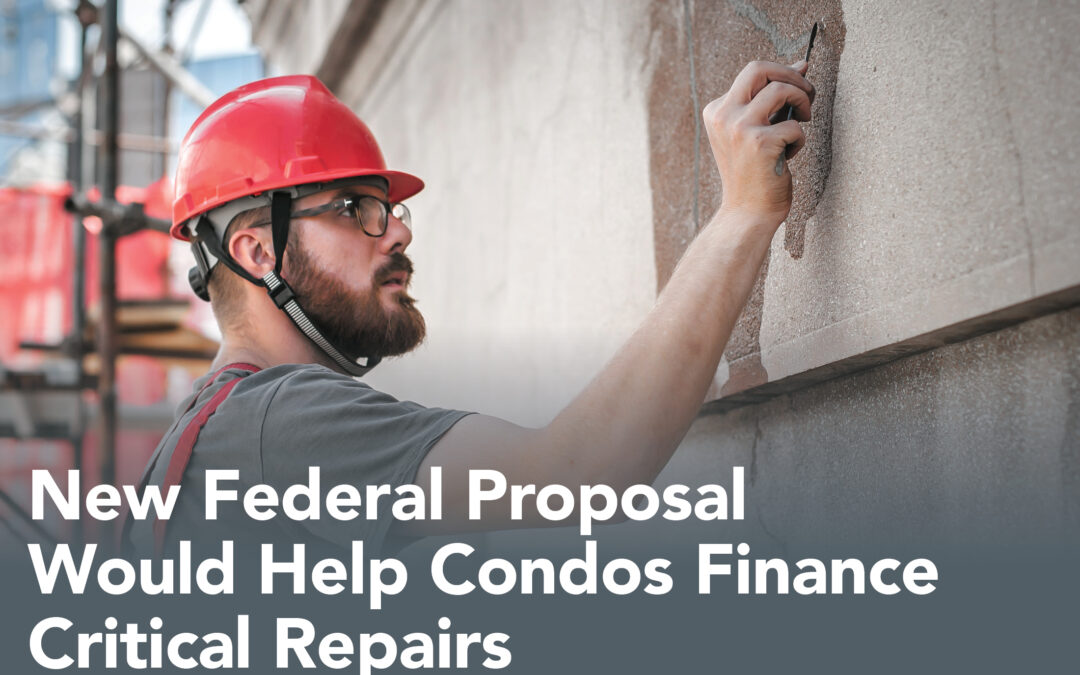This week, Reps. Charlie Crist (D-Fla.) and Debbie Wasserman Schultz (D-Fla.) introduced H.R. 8304, the Rapid Financing for Critical Condo Repairs Act of 2022, legislation that allows the U.S. Department of Housing and Urban Development’s Federal Housing Administration to insure condominium association building rehabilitation loans made by private lenders. “Access to FHA-insured building rehabilitation loans will provide significant benefits to condominium associations whose buildings are in need of critical repairs.” according to Don Plank of National Cooperative Bank (NCB), a lender specializing in condominium association loans.
CAI has been working with Rep. Crist for the past several months on legislation to help condominium associations finance critical repairs. Rep. Crist, along with Rep. Debbie Wasserman Schultz (D-Fla.), also introduced the CAI-backed legislation Securing Access to Finance Exterior Repairs (SAFER) in Condos Act of 2022.
CAI is working with Congressional members to secure sponsorships for the new legislation and a Senate companion bill. Please contact your representatives today and urge them to support this bill.
Background
Aging condominium buildings and infrastructure has been a growing concern over the past several years. The Foundation for Community Association Research has produced research and reports calling for community association board members and managers to take reasonable steps to repair and preserve aging community infrastructure.
The demand for financial resources to make building repairs is likely to increase as states and localities follow the lead of Florida and enact condominium building structural safety inspection requirements and reform reserve requirements. As the nature of a building structural inspection is different than a reserve study with a site visit, it is anticipated many association boards will be faced with important decisions on how to proceed with unanticipated repairs.
Condominium associations often finance unanticipated building repairs with loans from private lenders. These loans tend to have short payment terms, ranging from 10 to 15 years and include prepayment penalties. Some association loans are structured so payments are made as if the loan has a longer term (e.g., payment amortized on 20- or 30-year schedule) but have a balloon payment due by year 10, which requires the association to refinance.
Legislative Summary
The Rapid Financing for Critical Condo Repairs Act amends Section 234 of the National Housing Act to authorize FHA insurance for condominium association building rehabilitation loans.
Condominium association loans are collateralized with pledges of future association assessment income. As FHA’s mortgage insurance programs are collateralized by real property, the legislation authorizes the agency to insure condominium association loans collateralized by assessment income or real property or a combination of the two.
Under the legislation, FHA-insured condominium association loans may be used for the rehabilitation, alteration, repair, improvement, or replacement of a condominium project’s common systems, infrastructure, and facilities.
To protect FHA and the U.S. government against financial loss, the legislation allows FHA insurance for only 90% of the cost of building rehabilitation work. This restriction operates in other FHA multifamily housing rehabilitation loan insurance programs.
Legislative Impacts
Loans insured by FHA are standardized products with 30-year terms, fixed-interest rates, and no prepayment penalties. Private lenders would continue to work with condominium associations to develop loan packages suitable to an association’s needs, but lenders will now have additional options for funding the loan. This could significantly benefit condominium associations and homeowners.
Improved Loan Terms
In the current condominium association loan market, lenders use their institution’s resources to fund the loan rather than originating the loan and selling it in the secondary market. This approach to lending (portfolio lending) is why most condominium association loans have short terms (e.g., 10 years or fewer). FHA-insured loans are typically eligible for sale in the secondary market and have 30-year terms.
Extending a loan’s term means debt service payments are reduced. Consider the following hypothetical, simplified example. A condominium association secures a loan in the current market for $12 million with an interest rate of 5.5%. With a 10-year term, annual loan payments are $1.6 million or $130,231 per month. Annual debt service for the same loan with a 30-year term is $817,600, or $68,134 per month, a 50% reduction.
Budget Certainty
A 30-year loan with a fixed interest rate supports budget certainty for association boards over the life of the loan. Debt service costs are fixed and pressure to refinance a loan prior to a balloon payment coming due is removed.
Budget certainty also means association boards can account for loan payments, or a portion thereof, in the regular operating budget. This eases the financial pressure on homeowners that accompanies special assessments with compressed payment schedules (e.g., five years) and ensures future owners and residents pay a fair share of building rehabilitation and maintenance costs.
Lower Interest Rates
FHA-insured loans tend to have a lower interest rate than portfolio loans as lenders do not carry the full risk of a loan default. Additionally, allowing lenders to sell condominium association loans in the secondary market lowers the risk to lenders that interest rates will fall. Interest rate risk is a key reason portfolio loans have comparatively shorter terms than loans sold in the secondary market.
Interest rate risk is also the reason condominium association loans often have prepayment penalties. FHA-insured loans do not have prepayment penalties, which allows a condominium association to refinance a loan if interest rates fall.
Resources:
Call To Action
Text of H.R. 8304
Legislative Summary



